- Home
- Laura Resnick
The Destroyer Goddess Page 2
The Destroyer Goddess Read online
Page 2
There were huge numbers of pilgrims crowding the camp at Dalishar these days. Even more were on the roads and rocky paths heading east, to distant Mount Darshon. Glowing eyes or a powerful fist in the night sky at Dalishar, the strange dances of colored smoke and flashing lights at the snow-capped summit of Mount Darshon, the wild-eyed worshippers from all over Sileria streaming toward Dar's home in answer to some strange summons from the volcano goddess... And Mirabar, a Guardian of the Otherworld, preparing to share the marriage knife with Baran.
Najdan supposed it was just as well that no one had ever told him what his future held; he wouldn't have believed them, anyhow.
Now he, after too long an absence, was returning home to the miserable little village where he had been born. His mother and his two sisters, both married, were still here—if they were alive—and he had neglected them. He had ensured their safety and comfort throughout his years as an assassin, but he had not seen them or communicated with them since betraying Kiloran. That change of allegiance was not something he particularly looked forward to announcing to these women whom he scarcely even knew anymore, and his most urgent duties had kept him away from here lately, anyhow.
Najdan didn't think Kiloran would punish his betrayal by murdering his female relations, which would be a thoroughly dishonorable deed; but he needed to make sure—and also to bring them whatever money he could, as he had done for years. So now that there was time for this task, before he accompanied Mirabar and her new husband to Belitar, he came home again, to the hungry and desperate place which had once given him, in place of food, the passionate ambition to make something of his life so that he would never be hungry again.
He no longer wore the clothes of an assassin, and he kept his shir hidden inside one of his dusty boots. As Kiloran's enemy, rather than his servant, Najdan could no longer afford to draw attention to himself with the red and black colors he had worn for twenty years, or by openly displaying the beautifully-crafted water-born dagger which he would never relinquish or surrender. So he looked like just another sojourner when he entered the village, just another tired and hungry traveler on a hot Silerian day. Hardly anyone paid him attention as he made his way to his mother's simple stone house.
The tattered jashar still hung in the doorway, blowing in the slight breeze. Its knotted, woven strands proclaimed his family's lineage and history, humble even by the standards of shallaheen. He was the only man who had ever brought honor to the family, as well as food and security; the only man to make a name for himself, to improve his position, to gain even a little minor fame through his deeds.
Consequently, his mother and sisters thought he had hung the moons. Their fawning could be a little tiresome, but he looked forward to it today. After all, every man of worth enjoyed his share of it now and then.
He pushed aside the jashar and called out to his mother as he entered the low-ceilinged dwelling. She rose to her feet when she saw him. He was pleased to see her looking well—better than he expected, actually, considering the privations of the rebellion, the civil war, and the dry season.
Najdan grinned at the shocked expression on his mother's wrinkled face. "Did you think I was dead?"
He glanced at the other woman in the room—his youngest sister, Neysar—and saw her swallow as she rose to her feet, staring at him. Her wide-eyed gaze narrowed a moment later and she said, "We only hoped that you were."
Najdan frowned. The instincts of a lifetime in the Society had him moving away from the door even before the attack came, even before his sister said, "And now you will be."
Someone had noticed him enter the village, he realized, dodging the thrust of a shir from an assassin who flew through the door of his mother's little home. Men too shrewd to show themselves, too experienced to let themselves be seen.
The second attacker came through the door as Najdan pulled his shir from his boot and started swinging his yahr in a circle over his head.
Clumsy, he thought. They should have killed him before he even knew they existed. They should never have given him a chance to fight back. Searlon would have advised an ambush, would have told them he couldn't be taken as easily as most men; but, no, these two were young and wanted to prove their honor, wanted to defeat him in combat rather than through stealth.
One dropped to the ground and went for his legs, a surprise ploy that worked against many opponents. Najdan broke his nose with the yahr, then trapped the shir-wielding hand beneath his boot heel. He came down hard on the assassin's spine with a knee and heard it snap. The screams told him his opponent wasn't dead, but Najdan knew he was no longer a threat, so he ignored him and went after the other one.
This one was impatient. Najdan saw it and guessed that he had been waiting for him to show up in this dull little village for quite some time. Najdan baited him, letting his impatience turn to recklessness. When the attacker overcommitted on a thrust, Najdan stunned him with the yahr, then drove the wavy-edged blade of the shir up under his ribs and into his heart.
The body dropped to the ground, the thud barely audible above the screams of the assassin with the broken back. Najdan walked through his victim's blood and tracked it across his mother's rush-covered floor, then slit the throat of the screaming man.
Only then did he look at the womenfolk who had betrayed him.
His mother was weeping, pleading for him to tell her it wasn't true, none of it was true, it was all a mistake. His sister was ordering her to be quiet, not even to speak to this filthy sriliah.
Najdan looked at his mother, at the woman who had loved and tended him until the day he left home to make his first kill and gain Kiloran's esteem, and he said something he didn't think he had ever said to anyone before: "Let me explain."
"No!" his sister shouted. "You betrayed Kiloran! You have betrayed us all!"
"There was a reason," he said, already knowing it would do no good.
Najdan knew these people. He knew their absolute loyalty to traditional ways and their fear of the Society. He knew their awe of Kiloran. He knew all this because he had been one of them.
"You are dead to us!" his sister hissed. "Dead. I have no brother."
"Mirabar—"
"Has her own people! As you had yours."
He heard someone approaching the door and he prepared for more combat. Then he saw his eldest sister and lowered his guard. "Nulimar..."
Her eyes were cool, where Neysar's were hot. She had always been the more intelligent one. "You made your choice, Najdan." She looked at the corpses polluting her mother's house. "And you will live with it for a while longer, I see."
"The world has changed," he said. "Th—"
"Not that much," said Nulimar. "Not here. Some things are still unforgivable. Some things still make a man dead to his family, though he walks and talks even after they've finished mourning him."
"Kiloran takes care of us now," Neysar told him. "He mourns you, too, for he loved you like a son."
"And you betrayed him," Nulimar said.
Najdan said, "I did what I thought was right."
His mother wailed, and Neysar screeched, "You thought betraying your master was right? You thought humiliating us before the entire village—the entire clan—was right?"
"The Firebringer—"
"Is dead!" Neysar shrieked. "Now who is master of Sileria? Now who deserves our loyalty and love?"
He said, "Kiloran will never deserve to—"
"Get out!" Neysar screamed. "Get out of this house! You are dead to us! Don't ever come back!"
Najdan looked at his mother, who was weeping in his sister's arms. He could think of nothing to say besides, "I've brought you some money t—"
"Don't bother," Neysar snapped. "Kiloran ensures that we have all we need."
Najdan took the small purse he had brought and put it on the rickety wooden table. "I want you to have this, even so."
"We'll just put it on the funeral pyre along with the corpses you've given us today."
"That's
your choice," he said quietly.
"Get out," Neysar repeated. She indicated their mother. "Can't you see how you're hurting her?"
He nodded. "I'll go." He took one last look at his mother. "Goodbye." He wasn't even sure she could hear him above the noise of her own sobs.
He walked past Nulimar, who followed him outside. Most of the village was gathered there now. Their expressions ranged from blank to openly hostile.
"You knew how it would be," Nulimar said quietly. "Surely you knew." When he didn't reply, she added, "Or did you even think about us at all?"
Najdan had, but too late, much too late. Kiloran had thought of them first. And so Kiloran had won. They were his now.
Tansen had told Mirabar to go to Sister Velikar's Sanctuary to await news from Baran, so that seemed the best place to start looking for her. He had journeyed most of the way from Shaljir on horseback, despite Zarien's discomfort and occasional accidents, then simply abandoned their mounts when the way became too narrow, steep, and rocky for riding to be practical.
Now, as he approached Sanctuary, half-dragging the exhausted sea-born boy with him, he prayed silently to Dar to protect Mirabar, who had served Her so bravely and faithfully.
A sentry saw him, and before the shallah could even greet him, Tansen shouted, "Do you know where Mirabar is?"
"At Velikar's!" was the reply.
Relief flooded his heart.
"Gods be praised," Zarien murmured breathlessly, yanking his wrist out of Tansen's grip. The boy sank to the ground and urged him, between panting breaths, "Go. Leave me... here. I'll... catch up... later."
Mount Dalishar was safe enough, Tansen supposed—much of it well-guarded ever since the ambush he had survived. "Don't be long."
Zarien fell back gratefully on the rocky soil, closed his eyes, and waved him away.
It didn't take Tansen long to reach the simple stone Sanctuary, especially now that he wasn't hauling an ever-growing and tender-footed boy behind him. He saw a number of people he knew gathered there, and he easily recognized Lann—by his size and his beard—from a distance.
Tansen ignored all greetings as he approached and demanded of Lann, "Where's Mirabar?"
"Around there." Lann gestured to the back of the building. "Tansen, there's something you should—"
"Later."
"Uh, Tan?" Yorin said, his one remaining eye blinking rather a lot. "Maybe you should—"
"Tansen!" Lann tried again.
Behind him, he heard Pyron saying to them, "Let it go."
"But—"
"You don't really want to be the one he hears it from, do you?"
Tansen ignored them all in pursuit of his woman. He found her standing in Velikar's garden, talking with Najdan. Her fiery hair was dressed with flowers today, a feminine whim he'd never seen her indulge before, and she wore unusually fine clothes—a simple confection of wild gossamer. Her back was to him as she faced Najdan. Tansen stopped abruptly, willing the pounding of his heart to ease and let him behave rationally now that he knew she was safe.
"You're sure your family were well?" she asked the assassin probingly.
"Yes." Najdan's answer was quiet and without expression.
"Because you don't seem quite your—"
"They're well," was the terse reply. Then Najdan saw Tansen. "Uh..."
"Maybe you should bring them to Dalishar," Mirabar persisted.
"I already told you. Not with us, and not to Dalishar," Najdan replied, staring uncertainly at Tansen. "They're safe where they are."
"Then why are you..." Realizing he saw someone behind her, Mirabar looked over her shoulder. When her gaze met Tansen's, she gasped and flinched.
"I'm glad to see you, too," he said dryly.
"Tansen." Her intense tone surprised him.
It finally dawned on him that her unaccustomed finery must be for a special occasion. He frowned. "It's not a festival day, is it?"
The Guardian and the assassin just stared at him.
"Well?" he prodded.
Najdan and Mirabar exchanged a glance. Then they looked at him again.
"What?" Tansen asked.
Najdan suddenly moved. Mirabar put a hand on his arm. Her gaze, when the assassin looked down at her, was almost pleading.
Najdan said, in the sternest tone Tansen had ever heard him use with Mirabar, "I'm not staying for this. This is between the two of you."
Mirabar let out her breath on a puff of exasperation and released him. Her fire-bright eyes glowed almost yellow as she watched Najdan walk away. When she and Tansen were alone, she folded her hands and, after a long pause, asked, "What are you doing here?"
"What's going on?" he demanded.
"Aren't you supposed to be in Shaljir?"
"Mirabar."
"What happened at sea?"
"Oh, that..." He shook his head. "It's a long story, but nothing happened."
"So you're..." She looked a little upset. "You're not the one whom Zarien was sent ashore to find and bring back to Sharifar as her consort?"
"I don't know," Tansen admitted, thinking of the price the sea goddess had demanded of Zarien in exchange for his life after a dragonfish killed him. He had intended to go to sea with Zarien, who was convinced that Tansen must be the sea king he sought, but... "We had an unexpected change of plans."
"What happened?" Mirabar asked.
"First, tell me what's—"
"Tansen!"
He made a vague gesture. Her eyes followed the movement—then widened. She came closer and took his left hand between both of hers. Her touch set his heart to pounding again.
"You've sworn another bloodvow," she observed.
"Oh. Yes..."
She looked so beautiful. As beautiful as the mountains of Sileria. How had he ever, even at first, failed to see her beauty? He couldn't even remember what idiocy had prompted him to flinch in superstitious fear the first time he had ever looked into those passionate flame-gold eyes.
Mirabar was a shallah and immediately understood the significance of the deep, slowly healing cut on his palm. "A bloodpact relation," she murmured.
"I've become a father," he told her.
She didn't have to ask whom he had taken for a son. "But doesn't he already have a fath—"
"When we got to Shaljir, we found out they were dead. His whole family and most of his clan."
"Dead?" Her face clouded with sorrow for Zarien.
"They died... well, not long after he did. Only no goddess brought them back to life."
"What happened?" Mirabar asked.
"They were killed at sea, when an earthquake on land swelled the waves and flung their boat against the rocks." Tansen told her everything else that he knew about it. Except Zarien's secret, of course, which it was not his right to share without permission...
"My real father wasn't sea-bound. Not even sea-born. My father was a drylander." Zarien's words were choppy and harsh.
"Who was he?" Tansen asked.
"I don't know."
"I see. And your mother?"
Zarien shook his head. "I don't know."
"So Zarien threw Sharifar's gift to him, that oar—what did he call it, a stahra—into the sea?" Mirabar said, looking a little shocked. "To break the bargain she made with him the night she gave him back his life?"
The stahra—a traditional weapon of the sea-born folk—did indeed look like an oar. Tansen said, "He's very angry at Sharifar for letting his family die." Adopted in infancy, Zarien had believed they were his real family until the night, deep beneath the sea's surface, when Sharifar restored his life and told him the truth. And now the boy grieved for them as his real family. "He has turned his back on the sea."
Mirabar said with concern, "I understand. But even so... What if he changes his mind later? The stahra—"
"—was meant to lead him to me. It's not needed anymore."
"We don't know that," Mirabar objected. "Not really. Sharifar's will can be interpreted in a number of—"
/> "Well, it's gone, either way," Tansen said. "And there's nothing we can do about it now."
"A quarrel with a goddess is dangerous," Mirabar said pensively.
"I know."
Her gaze flashed up to his. "Yes. Of course."
Unable to resist, he reached up to touch one of the brilliant yellow flowers decorating her lush hair. "Now tell me. What's going on here?"
"Um..." She licked her lips. "Well, you're going to find this very strange. I didn't expect you back so soon. I hadn't yet really considered how I would tell you—"
"Tell me what?"
From behind him, a gruff female voice said, "Aren't you ready yet? Baran's getting bored."
Tansen whirled to face Sister Velikar.
"Oh. You're back. Hello," Velikar said, with about as much warmth as she ever showed.
"Where is Baran?" Tansen demanded.
Sister Velikar jerked her chin. "Inside."
"He's here?" His swords were in his hands before he realized he had unsheathed them. Halfway across the garden, he felt Mirabar's arms around him, her weight dragging against him to slow him down.
"Stop!" she cried. "No!"
"He's come to kill you!" said Tansen.
To his astonishment, Velikar laughed.
He stopped and glared at the Sister. "Sanctuary. I know. But whatever that madman is planning, Mirabar won't be safe the moment she leaves—"
"You haven't told him?" Velikar said to Mirabar.
"He just got here," Mirabar replied.
Still ready for combat, Tansen snapped, "Told me what?"
Mirabar cleared her throat. "We're getting married."
"Who?"
"Me and Baran," she said.
He was sure the sky tilted. "You're what?"
"Getting married," she said. "That's what I've agreed to, to convince him to side with—"
"You're WHAT?" he shouted.
Velikar said, "I'll leave you two alone."
He ignored the retreating old woman as he shouted at Mirabar, "What in the Fires are you talking about?"
"Baran set a price for his help," she said. "I've met it."
Tansen stared at her in speechless confusion.

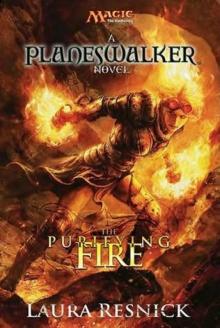 The Purifying Fire p-2
The Purifying Fire p-2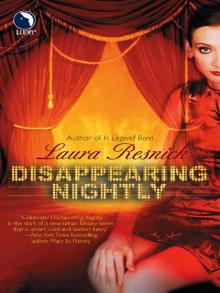 Disappearing Nightly
Disappearing Nightly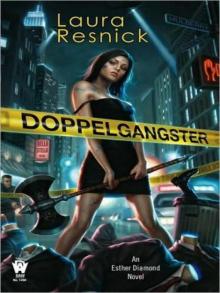 Doppelgangster
Doppelgangster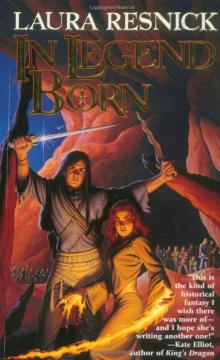 In Legend Born
In Legend Born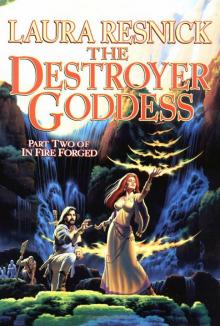 The Destroyer Goddess
The Destroyer Goddess The Purifying Fire: A Planeswalker Novel
The Purifying Fire: A Planeswalker Novel Vamparazzi
Vamparazzi A Wilder Name
A Wilder Name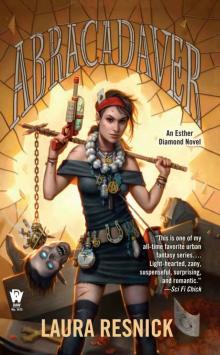 Abracadaver (Esther Diamond Novel)
Abracadaver (Esther Diamond Novel)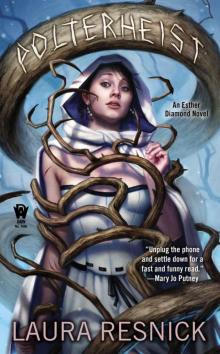 Polterheist: An Esther Diamond Novel
Polterheist: An Esther Diamond Novel The Misfortune Cookie ed-6
The Misfortune Cookie ed-6 Fever Dreams
Fever Dreams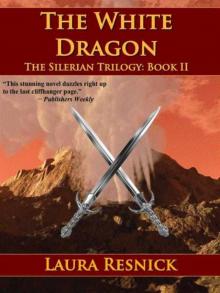 The White Dragon
The White Dragon Dopplegangster
Dopplegangster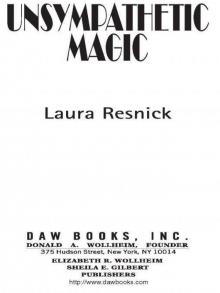 Unsympathetic Magic
Unsympathetic Magic